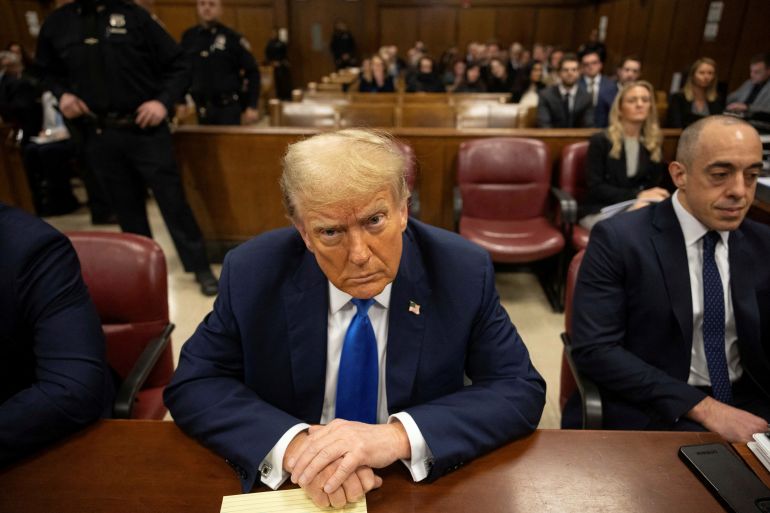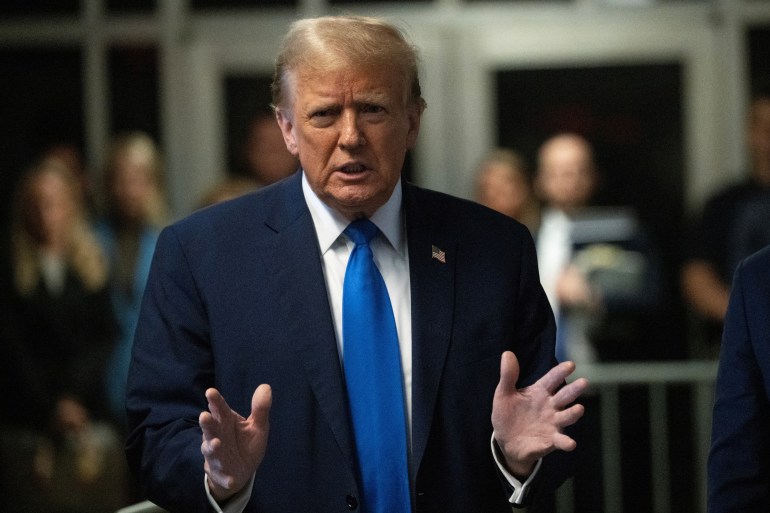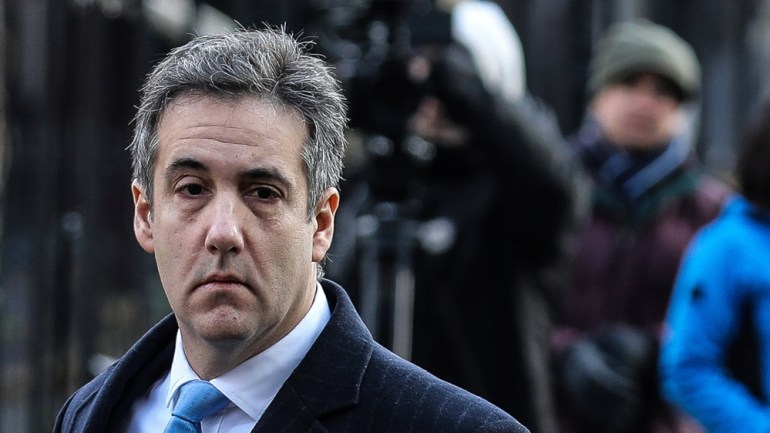‘Battlelines’ drawn as jury hears opening remarks in Trump hush money case
Opening arguments deliver starkly different portraits of the former US president in historic criminal trial.

In a historic day in the United States, a New York jury has heard opening arguments in the hush-money case against Donald Trump — the first criminal trial against a former president in the country’s history.
Assistant District Attorney Matthew Colangelo on Monday laid out the allegations against Trump, who is accused of falsifying business records to conceal payments made to an adult film star with whom he is accused of having a sexual relationship.
Keep reading
list of 3 itemsHow will Donald Trump’s trial affect the future of the US?
What will Trump’s legal troubles mean for 2024 elections?
Prosecutors allege that the money was intended to silence the adult entertainer, Stormy Daniels, before the 2016 US presidential election.
“This case is about a criminal conspiracy and a cover-up,” Colangelo said, as reported by US media outlets inside the New York City courtroom.
Trump’s legal team also presented its defence in an opening statement on Monday morning, rejecting the state’s allegations in their entirety. “President Trump is innocent. President Trump did not commit any crimes,” his lawyer, Todd Blanche, said.
The opening arguments set the tone for what is expected to be a tense, six-week trial, the outcome of which, experts said, may have wide-reaching consequences for the country.
“Each side did what most legal experts expected,” said Ronald Sullivan Jr, a professor at Harvard Law School and director of the Criminal Justice Institute.
“The prosecution characterised the conduct as a scheme, and in contrast, the defence came out and characterised the conduct as not criminal at all,” Sullivan told Al Jazeera.
“I think this is where the battlelines are going to continue to fall.”
Legal threshold
The New York case is one of four criminal indictments against Trump, who is the presumptive Republican Party nominee heading into November’s presidential election despite his legal troubles.
The former president faces 34 felony counts of falsifying business records in relation to payments made to Daniels, who said she had a sexual encounter with the married real estate developer-turned-politician.
Trump has denied that claim and slammed the indictment as a politically motivated “witch-hunt”.
Prosecutors have zeroed in on the political dimensions of the payments, and Colangelo argued on Monday that Trump engaged in a conspiracy that aimed to “undermine the integrity” of the 2016 presidential election.
Trump defeated Democratic presidential candidate Hillary Rodham Clinton in that contest.
Meanwhile, Trump’s lawyer argued that “there’s nothing wrong with trying to influence an election”. “It’s called democracy,” Blanche said in his opening arguments.
Gregory Germain, a law professor at Syracuse University, said that argument highlighted the central legal question in the case, which is whether Trump’s alleged falsification of business records, a misdemeanor, rises to the level of a felony crime under New York law.

To be considered a felony, the falsification must have been committed with “intent to defraud and intent to commit another crime”.
Legal observers have noted it is somewhat unique – but not unprecedented – to charge a defendant in New York with felony falsification without charging him with a secondary crime.
Prosecutors will have to persuade a jury only that the falsification was done with “intent” to cover up or commit another crime, not that Trump was successful in committing that crime.
In court filings, the prosecution has suggested that the secondary crime committed by Trump could be a violation of New York state law that criminalises schemes “to promote or prevent the election of any person to a public office by unlawful means”.
It could also be a violation of federal election law governing spending disclosures or a violation of New York state tax law, they said.
In Monday’s opening statements, Trump’s defence stressed that, in and of itself, it is not a crime to “pay hush money”, Germain told Al Jazeera.
The defence were “clearly pointing out that elements are missing in [the prosecution’s] arguments”, Germain said. “They’re raising it for the jury, and I’m sure it’s going to be discussed at great length in closing arguments.”
The prosecution will ultimately have to provide evidence of the secondary crime, Germain said. “Those are the two essential elements to this criminal indictment. We’re going to have to see: where’s the fraud and where’s the [secondary] crime?”
Michael Cohen in focus
On Monday, both the prosecution and defence lawyers addressed one of the key witnesses in the case: former Trump lawyer Michael Cohen.
A convicted felon, Cohen has said Trump directed him to make the payment to Daniels.
Trump’s team has sought to paint Cohen has a disgruntled former insider who has a personal vendetta against the former president.
Shanlon Wu, a former federal prosecutor and political commentator, told Al Jazeera that the prosecution used its opening statement to preview Cohen’s testimony and get ahead of any defence arguments.
The prosecution emphasised two things, Wu said: “One is everything’s gonna be backed up by documents. It’s not just [Cohen’s] word against Trump’s.
“Second was laying out the fact that Cohen would help show the degree of involvement Trump had with everything going on, trying to in advance negate the defence saying Trump just didn’t know about the particular strategies or details of what was happening.”
Blanche described Cohen as a “criminal” who was “obsessed” with Trump. “I submit to you that he cannot be trusted,” the defence lawyer said.
According to Wu, the emphasis on Cohen by Trump’s legal team effectively “put all their eggs in one basket”.
“If Cohen does OK [during his testimony], they’re really kind of sunk. And then they have to backpedal,” Wu explained.
“And that may be at Trump’s urging to his lawyers. ‘This guy’s a traitor. He’s a scumbag. You really have to attack him,'” he continued.
“I think their best argument is to say, ‘Look, this is not about election interference. He was just trying to make this scandal go away for his family.’ I think they should have made that more of the focus.”

Views of Trump
It remains to be seen what consequences – if any – the trial will have on Trump’s re-election chances in November. He is expected to face off against the Democratic incumbent, Joe Biden, in a rematch of their 2020 contest.
A Reuters/Ipsos poll conducted this month found that 24 percent of Republican voters said they would not cast a ballot for Trump if a jury convicted him of a felony.
Another poll conducted by The Economist/YouGov showed that Americans are fairly divided on the merits of the case: 43 percent said they believed Trump should be convicted compared with 37 percent who did not.
But Monday’s legal proceedings provided both prosecutors and Trump’s defence team an opportunity to paint their respective portraits of the former president for the jury.
That is especially critical, Sullivan at Harvard Law School said, because “a supermajority of jurors make up their mind by the end of opening statements and they tend to retain that opinion throughout the trial”.
For example, Blanche described the former president on Monday as “a man”, “a husband” and “a father”. He also alluded to Trump’s connection to New York, where he built his real estate empire.
“Use your common sense,” Blanche told the jury. “We’re New Yorkers. It’s why we’re here.”
Sullivan explained that “one of the techniques of a good trial lawyer is to put their client in the jury box, metaphorically speaking, with the jury.”
And Trump’s lawyer is “wanting the jury to believe that the former president is one of them fighting against an overreaching state, and that [is the] basic theory that President Trump wants the jury to believe”, Sullivan said.
The prosecution, for its part, hoped to persuade the jury that Trump “is someone who simply never follows the rules and that no man is above the law”, Sullivan said.
Its argument, he added, is that “President Trump committed a crime and he should be held accountable.”